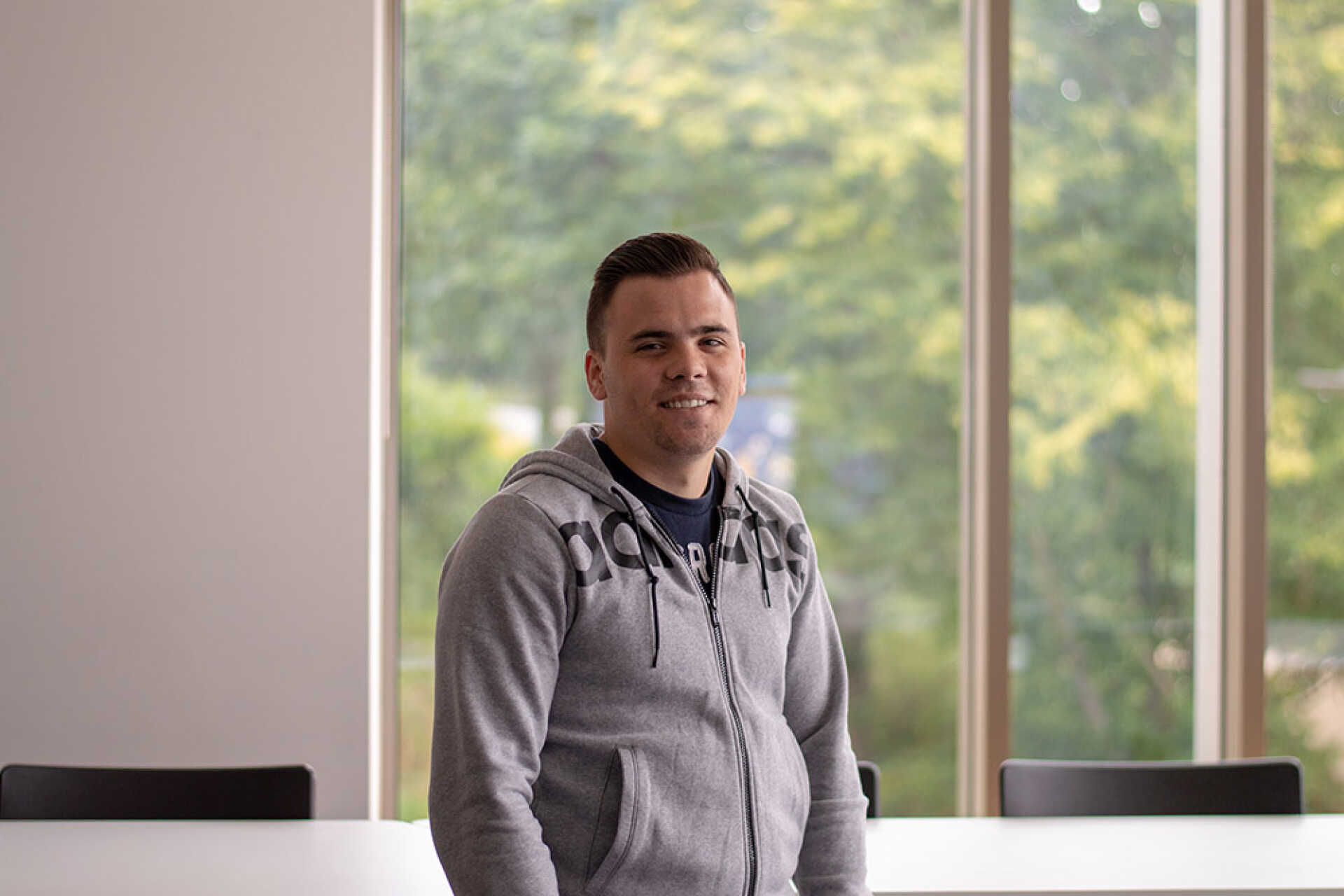Business and Marketing
with a Year in Industry
Develop the creative and analytical skills to influence people's decisions.

Develop the creative and analytical skills to influence people's decisions.
If you’re creative and have great communication skills with an interest in business then this course is for you.
A BSc in Business and Marketing will kickstart your career in marketing whilst keeping your options open to develop expertise in other areas of business too.
This course will help you to develop an understanding of cutting edge theory and industry-relevant practical skills in handling social media, web material, advertising, and broader brand development. Alongside marketing topics you’ll also learn essential areas of general business like HRM or operations management to putting the role of a marketer in context.
You take a year in industry following your second year of study, enabling you to apply your expertise in a work setting and earn a salary, too.
You’ll learn through a mix of lectures, seminars, and practical sessions delivered by our world-leading academics giving you the right mix of skills to succeed no matter your career path.

Gain the skills you need to stand out from the pack. Employability is at the heart of everything that we do for you.
Study at a ‘Triple Crown’ business school accredited by AACSB, AMBA, and EQUIS.

Take a ‘selfie year’ and bring your business ideas to life at our aspire centre.
Marketing is ranked 12th in the UK for graduate prospects in The Complete University Guide 2024.

Our expert teaching staff appear in the top 2% of researchers worldwide.
ABB
DDM
128 Tariff points from your IB Diploma, Typically H5, H6, H6 or equivalent
Mathematics grade 4 / C and English grade 4 / C.
Pass the University of Kent International Foundation Programme.
The University will consider applicants holding T level qualifications in subjects closely aligned to the course.
Access to HE Diploma with 45 Credits at level 3 with 30 credits at Distinction and 15 credits at Merit
We consider all applications on an individual basis during Clearing and you're encouraged to get in touch to discuss your grades. You're most likely to be offered a place in Clearing for this course if you hold the following subjects:
GCSE / IB - Mathematics
This module listing is based on the current curriculum and may change year to year in response to new curriculum developments and innovation.
Your first year is designed to provide you with a strong foundation in business practices, covering many topics including accounting and management. With an ever-changing international environment, you’ll gain an understanding of the challenges faced by global businesses and explore strategies to meet them. You’ll also start focusing on digital marketing and gaining skills in analysing business data.
In today's interconnected world, businesses operate across borders, facing challenges and opportunities in a dynamic global environment. You’ll develop expertise in the complexities of international business and acquire the skills to analyse the impact of globalisation, trade, investment, political systems, and ethics on business operations. You’ll understand the global business world and develop analytical skills to turn data into valuable information for business decisions and position yourself for success in international business.
Excel is a highly demanded skill by employers, in both starting your career and making rapid progress throughout it. You’ll master the fundamentals of this powerful tool and also be introduced to some more advanced technologies that will give you an even greater edge in the workplace. Learn to think creatively through the application of analytics and Excel techniques to real world business problems.
In this era of rapid technological advancement, how can marketers effectively use digital media and technology? You’ll master the fundamentals of digital marketing and acquire the strategic skills needed to excel in this fast moving landscape. You’ll closely analyse success stories of marketers who adapt to new trends, including AI-driven approaches. You’ll be able to execute results-driven, end to end marketing campaigns with full knowledge of all available digital marketing modes to identify, anticipate and satisfy customer needs.
What are the best ways to manage people in organisations? How are decisions made about the design of work, the structure of an organisation, and who is accountable or responsible for different activities? What are the best ways to manage people in organisations? How are decisions made about the design of work, the structure of an organisation, and who is accountable or responsible for different activities? You’ll understand the practices of contemporary organisations by looking at a wide range of different theories of management, starting with classical management perspectives like scientific management or human relations theory and then considering more contemporary issues like culture management and leadership styles. Using case studies, you'll develop key skills like critical thinking and be able to reflect on the ethics and fairness of contemporary forms of work.
Marketing is an exciting and dynamic field that offers endless opportunities for innovation, creativity and growth. With advancements in technology, shifts in consumer behaviour and emerging trends, marketers have the opportunity to explore new strategies and tactics to help firms effectively reach and communicate with their target customers.
Creating brand awareness, engagement, satisfaction and loyalty is vital for sales growth in competitive and dynamic markets. You'll learn how to develop and implement effective marketing plans and strategies as well as exploring how key elements of the marketing mix can be used to create and communicate a distinctive value proposition that helps a product or service stand out from the competition. You'll gain the skills, knowledge and confidence needed to develop, deliver and refine digital marketing strategies that make employers sit up and take notice.
Make yourself an invaluable team member when you become the expert in identifying innovative solutions to business problems. You'll cover the core concept of data analytics, including data management, descriptive statistics, inferential statistics, exploratory data analysis, regression modelling, machine learning, programming data-driven solutions and developing data-driven recommendations.
You'll gain experience of using an industry standard programming language and graphical user interface (GUI) tools. By learning about the range of factors affecting a business and the statistical tools that a business can use to help with decision-making and planning, you'll develop the ability to be commercially aware and be more confident to contribute to discussions about issues affecting business and how to respond.
The module is designed to teach students how to prepare, read and interpret financial information with a view to their being future business managers rather than accountants.
The module will begin with a brief demonstration of bookkeeping using an easy understandable approach. Students will be shown how to prepare financial statements from a trial balance and make adjustments to the figures given by acting on information given in a short scenario.
The regulatory framework of financial reporting will be considered with annual reports and accounts of a variety of organisations. The module will end with an analysis of financial statements with students shown how to interpret data and make sensible recommendations.

The process of leading employees – or managers – and helping them and yourself to be creative is very interesting.Jacquelynn Coughlin
During the second year of your degree, you’ll delve further into marketing and the different ways it can make a business stand out. You’ll learn to manage a brand, develop a strategy, and conduct market research to inform good decision making. Through study of business ethics and sustainability, digital marketing strategy, branding, and consumer behaviour, you’ll become confident and effective in applying your knowledge to contemporary business situations.
In competitive marketplaces, strategic marketing planning is essential for firms seeking to reach their target customers, foster brand awareness and increase revenue.
In this module, you’ll develop your understanding of marketing strategy and planning by learning how to systematically approach and develop a strategic marketing plan for a commercial or social organisation. Through this process, you’ll learn the tools marketers use to assess market opportunities and evaluate their competition. You’ll also practice your skills by responding to live briefs and practical marketing simulations, gaining crucial hands on experience.
You’ll also learn by considering case studies and hearing from guest speakers will boost your understanding and appreciation of marketing strategy and the issues, challenges and ethical dilemmas marketers face. If you want a career where you lead on impactful and successful marketing campaigns, this module is your first step to getting there.
As businesses embrace digital marketing as a tool to reach key audiences and deliver results, they need experts in strategy and planning to give their campaigns an edge and ensure they are successful. Through collaborative projects and hands-on workshops you'll become the kind of expert businesses are looking for. You’ll gain the skills, knowledge and confidence needed to develop, deliver and refine digital marketing strategies to drive results and enhance brand visibility in a competitive landscape. Being a leader in digital marketing gives you the edge that makes employers sit up and take notice, not only ensuring you’ll jump into a successful and exciting career, but you’ll be a driving force in the field.
Consumer behaviour is a critical exploration of how consumers and organisations engage with products and services. Society, culture, identity, and psychology all influence consumer habits. So, what can marketers learn from the social and cultural world?
You'll discover why consumers from different backgrounds react uniquely to the same products, what drives these consumption patterns, and how culture shapes our buying decisions. You’ll explore the social and cultural intricacies of consumer behaviour and gain the insights needed to connect, engage and succeed in a global marketplace.
By embracing a wide spectrum of philosophical and research perspectives, you’ll gain a multifaceted understanding of the subject, alongside critical thinking skills. This will greatly enhance your employability and prepare you to tackle complex problems as you begin your career.
Marketing research helps businesses to understand their markets and target consumers, and identify opportunities that inform decision-making about the business and customers.
You’ll learn how to use traditional marketing research techniques to gain insights into consumer behaviour before delving into the analysis of digital data from online sources and interactive dashboards. You’ll gain hands-on experience using analytical software that will give you the skills needed to navigate digital data landscapes, analyse customer behaviour and trends, and extract actionable insights into customers and competitors.
Embracing this data-driven approach to market research ensures that your marketing strategies are grounded in empirical evidence. This results in meeting customer expectations better, building stronger relationships, and fostering brand loyalty.
How do brands differentiate themselves from their competitors? How do they create competitive advantage in a crowded marketplace? This module covers four main areas: developing brand strategy, implementing brand management, evaluating brand performance, and sustaining brand growth.
By studying these four areas, you’ll gain insights into formulating effective strategies, executing brand management practices, assessing brand effectiveness, and fostering long-term brand growth in dynamic market environments.
You'll delve into real world case studies, engaging discussions and collaborative projects, so you'll not only grasp the theoretical foundations but also cultivate practical insights into the dynamic world of branding. You'll emerge with a profound understanding of how to strategically build and manage brand identities that leave a lasting impact and produce results.
What is the impact of a changing world on cross-border management? How can culture, organisation, communication, leadership, and ethics be managed effectively in different locations? The current era offers unprecedented excitement and opportunities for learning.
You'll gain a comprehensive introduction to the latest research on cross-cultural management. Based on critical analysis of the assumptions underlying various approaches to studying national cultures, you’ll apply frameworks to understand cross-cultural issues managers in international organisations may face. Some of the topics you’ll study include different approaches to cross-cultural management, cultural frameworks and how to apply them, the role of the global manager, and global management challenges.
Experiential learning and teamwork are integral to the module and the teaching is highly participative. You’ll participate in various group exercises including an assignment in partnership with Kelley School of Business in the USA. This active experience working with peers and with another international institution helps you make rapid progress in your understanding of cross-cultural management, giving you an edge in the job market.
Are you interested in starting your own business? What are the tools and skills you need to do so? Why are startups becoming more popular? We’ll delve into the social and economic changes that have raised the status of enterprises, small businesses, and entrepreneurial ventures in the global economy.
We’ll consider entrepreneurs, their characteristics and motivations, and the barriers and issues that they face when planning and establishing a new startup venture. You'll learn what makes new ventures grow and succeed, and evaluate the practical decisions that entrepreneurs need to make to maximise the chances of their business succeeding.
In today's business environment, a wealth of data is available but many businesses find it difficult to transform that data into usable information that can shape meaningful decisions. In this module, you’ll learn to extract insights from historical data through interactive visual analytics, communicate complex information effectively, and gain hands-on experience using data to drive positive change in business, environment and society.
You’ll also explore advanced pattern recognition and forecasting techniques, enabling you to foresee future outcomes and trends. You’ll explore real-world case studies from diverse industries, giving you a deep insight into how data analytics is integral to the supply chain management, marketing, healthcare, and finance sectors.
By the end of this module, you’ll have the skills and knowledge to transform data into actionable insights and predictions, positively impacting any organisation you work for and driving growth.
Making decisions is crucial for managers and businesses, as they shape our lives and impact outcomes at work. However, making smart decisions in the face of complexity and uncertainty can be challenging. How can data support our decisions in such uncertain contexts?
Together we’ll explore various quantitative and graphical methods that help identify, represent, and evaluate different options. These can help us make optimal decisions. We’ll guide you through the decision-making process in organisations, using an evidence-based approach drawn from research in behavioural psychology, economics, error management, and intuitive judgment. These tools will help you to make sound decisions in uncertain situations, enabling you to influence and lead effectively.
By the end of the module, you’ll have a deep understanding of informed decision-making methodologies. You’ll learn how to analyse problems, identify potential solutions, and evaluate outcomes in uncertain conditions. You'll be able to make decisive decisions supported by data and evidence in order to drive growth and deliver results for businesses.
Gain an in-depth and critical understanding of the complex and volatile work environments they may experience in the workplace. The development of relevant knowledge and skills to thrive and lead in today’s dynamic workplace in an ethical and sustainable way is a vital toolkit for today’s graduate. In doing so, you will understand the importance of values-driven and inclusive leadership, collaborative working, employee well-being, valuing difference and championing diversity, creativity, innovation, managing change and the role of AI. This will enable you to develop the knowledge and skills-base needed by business professionals.
International Marketing offers companies the opportunity to expand their business and reach new customers on a global scale. You’ll learn how to identify and evaluate new market opportunities, assess different ways to enter potential markets and appreciate the range of influences that exist in the international marketing environment that might require adaptations to marketing strategy and programmes. By taking a problem solving approach to the opportunities and challenges international marketers face, you’ll learn how to apply key international marketing theories and frameworks to help you demonstrate and develop the essential critical thinking and analytical skills needed in today’s workplace to justify your decision-making.
Many developed economies are dominated by services, so it’s increasingly important to understand the customer decision making process involved with service encounters, as well as what’s involved in delivering quality service experiences and understanding how to positively influence customer perceptions at key touchpoints in the service delivery process. You’ll learn how the distinct characteristics of services create challenges for service marketers and explore how theoretical concepts and models of services marketing can be applied to address these challenges by examining the strategies and practices of service based companies. This will give you the skills and knowledge to formulate marketing strategies and programmes that are customer centric and enhance the service experience for target customers, enabling service organisations to compete more effectively.
All students spend a year in industry in the UK or internationally, supported by a dedicated Employability and Placement teams. The programme is designed to ensure that students gain experience in the functional areas and industries of their choice. For students taking one of the specialist pathways, our strategic partnerships provide opportunities for placements in specific areas.
Unique to KBS, students can take a Self-Employed Placement year during which they develop their initial business idea into a feasible business plan. The ‘Selfie’ programme students are supported by an in-house entrepreneur who acts as their specialist mentor.
The placement allows you to experience, first hand, many of the issues addressed in the taught programme and to use the tools, techniques and applications in a real business setting. It will become a vital component of your CV and will give you a distinct advantage over other business graduates.
The Year in Industry to which the module relates provides a structured opportunity to combine appropriate developmental work experience or entrepreneurial activity with academic study. The Year in Industry experience allows students to develop and reflect on managerial and / or professional practice in real and often complex situations, and to integrate this with the study of the relevant subject(s) of their main programme. Where relevant, they develop, reinforce and apply professional and / or technical expertise in an employment or entrepreneurial context.
The ability to integrate this work based learning with the modules of Stages 1, 2 and 3 is a high level cognitive task. The particular combination of the student's degree programme and choice of modules together with the great variety of increasingly diverse Year in Industry situations make the "curriculum" of each Year in Industry unique. The unifying features, with which the project for this module is concerned are integration of theory and practice, and the development of the student as an independent learner and reflective practitioner.
This background is why the report for the module has to be linked to the Year in Industry portfolio.
The assembly, content and organisation of this activity are assessed in BUSN6990 Year in Industry Experience. This module assesses how effectively the student can use this to demonstrate integration of theory and practice, self-assessment of achieved learning and reflection on this.
The Year in Industry experience provides you with a structured opportunity to combine work experience or entrepreneurial activity with academic study.
The Year in Industry allows students to develop and reflect on managerial and/or professional practice in real and often complex situations, and to integrate this with the study of the relevant subject(s) of your main degree programme.
Where relevant, students develop, reinforce and apply professional and/or technical expertise in an employment or entrepreneurial context. The placement portfolio requires students to document their experiences in relation to both their university studies as well as to a wide range of employability skills.
In addition, the portfolio allows demonstration of professional development through the collection and presentation of relevant evidence.
To be able to undertake this module it is necessary for the student to secure a placement or to have validated a Business Start-Up during Stage 2.
The Business Start-Up should build on the student's planned business activity as developed and validated by the ASPIRE Business Start-Up Journey.
The particular combination of the student’s degree programme and choice of modules together with the great variety of increasingly diverse Year in Industry situations make the "curriculum" of the Year in Industry essentially unique.
This module documents and assesses the evidence of Year in Industry learning being achieved.
In your final year, you’ll learn about essential topics including the role of marketing in society, using social media analytics, and marketing across international boundaries. There’s an exciting range of optional business modules for you to choose from, so you’ll be able to tailor your course to your aspirations. You’ll also grow your employability skills with our specially designed modules and extensive support.
Marketing communications serve as the voice of a brand. They create a dialogue that connects businesses with their audiences across various platforms and mediums. This module will examine how advertising fuses creativity and strategy to influence consumer behaviour and perceptions.
You’ll engage with tools like social media and search engine optimisation (SEO) to create conversations and nurture communities. Integrated marketing communications (IMC) ensure consistency across all channels, amplifying the resonance of each message. Ethics and sustainability practices that guide responsible marketing are at the heart of the module: respecting privacy, ensuring transparency and embracing sustainable practices that prioritise long-term well-being over short-term gains.
You’ll enhance your employability by blending practical, applied learning with essential marketing concepts. By engaging directly with current advertising tools, digital platforms and real-world case studies, you’ll be able to apply your knowledge effectively in a professional setting. You’ll learn the theory and strategies to navigate digital landscapes and uphold ethical standards. This hands-on approach, combined with insights into sustainability, prepares you to enter the workforce with the confidence and skills needed to excel in a dynamic industry.
This module aims to equip you with the knowledge and skills to identify, analyse, and evaluate ethical issues in business. Through critical reflection and analytical argumentation, you’ll develop the ability to articulate your views and critique opposing perspectives on ethical matters.
The focus of this module is on gaining an in-depth understanding of business ethics and cultivating critical thinking skills, enabling you to emerge as a conscientious leader in your field. Corporate social responsibility and sustainability are central themes due to the growing interest and expectations from stakeholders on environmental and social performance.
The module covers essential theories such as utilitarianism, deontological theories, corporate social responsibility, and the triple bottom line, applying these concepts to real-life business situations through case studies.
In the rapidly evolving world of business, developing and implementing effective strategies is vital for success. This module equips you with the knowledge and skills necessary to excel in the field of strategic management.
You’ll engage in rigorous analysis and critical thinking to explore a range of strategic concepts. These include the fundamentals of strategic planning, advanced topics in supply chain dynamics, and issues such as quality management, technology-driven innovation, and project/event management.
Throughout the module, you’ll engage in interactive discussions, group projects, case studies, and hands-on exercises to enhance your problem-solving and decision-making skills. By the end, you’ll have the ability to analyse and apply critical thinking to evaluate strategic alternatives and make informed recommendations.
In a world marked by perpetual transformation, how can emerging leaders adeptly navigate the challenges and seize the opportunities that shape corporate strategies? Through engaging and interactive sessions, students will unravel the complexities inherent in leadership principles and strategic decision-making. Hands-on applications are used, ensuring that, alongside the theoretical knowledge, you develop the practical skills essential for effective leadership in the contemporary business environment. You will leave the module with a knowledge of corporate strategy tools that are indispensable resources utilized by organisations to navigate the intricate landscape of strategic decision-making and planning.
An introduction to the concept of behavioural science and how its insights can be applied to the workplace. Behavioural Science is drawing from multiple scientific disciplines (e.g. psychology, behavioural economics). It aims to give new insights into how our minds operate in the modern business world. Applied to the workplace it can help us to shed new light onto a wide range of issues relating to HR. You'll gain a first insight as to how the developing cross-disciplinary field of behavioural science and provide you with novel tools to overcome organisational challenges. For example, you'll cover how behavioual sciences can help us to understand how our decision making can be inherently biased and affect selection and assessment processes or equality and inclusivity within the workplace, how humans are motivated, how the workplace environment can be affected by workplace interactions both between individuals and teams, or how stress or wellbeing are influenced by a number of workplace factors.
The law expects businesses to be governed responsibly and individuals within them to be mindful as to how they fulfil their legal obligations to their customers, the environment, their workforce and the public. You'll study negligence, company, employment and discrimination law, emphasizing responsible business governance and individual accountability. By analysing current legal issues and applying them to real-world scenarios, you'll enhance problem-solving skills, understanding of diverse impacts and ethical decision-making in business. Navigating complexities and ambiguities fosters critical thinking and integrity, preparing you for future studies and careers.
Study the different ways in which people operate within organisations. You're introduced to the strategic use of data in people operations to tackle workplace challenges effectively. You'll learn various methodologies for analysing and interpreting data to improve organisational performance and employee well-being. Explore diverse data collection, processing and utilisation techniques. Through practical exercises and case studies, you'll learn to extract valuable insights, recognise patterns and make informed decisions to optimise human capital management. Ethical considerations such as privacy and confidentiality are emphasised, ensuring responsible data usage. You'll leave with a thorough understanding of how data-driven approaches can positively impact organisational culture and productivity.
How do you think creatively for business and startup planning? You'll address opportunity recognition, product development, business proposal creation and entrepreneurial finance. Through teamwork, you'll develop leadership, problem-solving, communication and analytical skills. Analogies from diverse cultures aid personal connections, while the curriculum emphasises sustainability, lifelong learning and systems thinking. You'll gain entrepreneurial confidence, adaptability, opportunity recognition, risk management, and innovative mindset for diverse career paths.
International Marketing offers companies the opportunity to expand their business and reach new customers on a global scale. You’ll learn how to identify and evaluate new market opportunities, assess different ways to enter potential markets and appreciate the range of influences that exist in the international marketing environment that might require adaptations to marketing strategy and programmes. By taking a problem solving approach to the opportunities and challenges international marketers face, you’ll learn how to apply key international marketing theories and frameworks to help you demonstrate and develop the essential critical thinking and analytical skills needed in today’s workplace to justify your decision-making.
Many developed economies are dominated by services, so it’s increasingly important to understand the customer decision making process involved with service encounters, as well as what’s involved in delivering quality service experiences and understanding how to positively influence customer perceptions at key touchpoints in the service delivery process. You’ll learn how the distinct characteristics of services create challenges for service marketers and explore how theoretical concepts and models of services marketing can be applied to address these challenges by examining the strategies and practices of service based companies. This will give you the skills and knowledge to formulate marketing strategies and programmes that are customer centric and enhance the service experience for target customers, enabling service organisations to compete more effectively.
Designed to ignite your entrepreneurial spirit, inspire you to recognise the potential for international success and equip you with the knowledge and tools to navigate the complexities of the modern industrial age. Through a combination of theoretical concepts and interaction with entrepreneurs, you'll gain insights into international opportunities, the critical factors contributing to initial success, and strategies for sustained growth.
Interdisciplinary thinking is encouraged, fostering the ability to merge theories from different subjects to solve complex problems. You'll develop independent study skills and effective communication, both orally and in writing, while honing their critical thinking abilities. You'll consider teamwork in multicultural settings, preparing you to work efficiently and effectively in diverse, cross-border collaborations.
You'lll emerge with a multifaceted skill set, including the capacity to work across disciplines, plan and study independently, communicate effectively, think critically and und
Our enthusiastic team of international teaching staff are all experts in their field of study and are regularly published in leading journals worldwide. They guide and support your learning, bringing their subject to life and drawing you into the conversation through lectures, seminars, presentations and computer-based simulations.
Your progress is assessed through a mix of coursework – including reports, essays and presentations - and exams. Undergraduate students can expect around 8 contact hours per week, depending on year of study and optional module choices made. The remainder of the working week consists of self-guided study.
As part of your studies it is also possible to take a foreign language module in stage 1 and for students going on a Year Abroad in year 1 and 2 subject to programme requirements. Alternatively, our university also offers language courses as part of extra-curricular activities.
Undergraduate students can expect around 8 contact hours per week, depending on year of study and optional module choices made. The remainder of the working week consists of self-guided study based on degree programme content and requirements of specific modules. For a student studying full time, each academic year of the programme will comprise 1200 learning hours, which include both direct contact hours and private study hours. The precise breakdown of hours will be subject dependent and will vary according to modules. Please refer to the individual module details under Course Structure.
For programme aims and learning outcomes please see the programme specification.
Our Marketing graduates go on to careers in all aspects of marketing, business and management, finding both overseas and in the UK in a wide range of companies and organisations, including:

For students continuing on this programme, fees will increase year on year by no more than RPI + 3% in each academic year of study except where regulated.*
The University will assess your fee status as part of the application process. If you are uncertain about your fee status you may wish to seek advice from UKCISA before applying.
For details of when and how to pay fees and charges, please see our Student Finance Guide.
Fees for undergraduate students are £1,850.
Fees for undergraduate students are £1,385.
Students studying abroad for less than one academic year will pay full fees according to their fee status.
Find out more about accommodation and living costs, plus general additional costs that you may pay when studying at Kent.
Kent offers generous financial support schemes to assist eligible undergraduate students during their studies. See our funding page for more details.

We have a range of subject-specific awards and scholarships for academic, sporting and musical achievement.
We welcome applications from students all around the world with a wide range of international qualifications.

Student Life

In the QS World University Rankings 2024, Kent has been ranked 39th within the UK and is in the top 25% of Higher Education Institutions worldwide.
Kent Sport
Kent has risen 11 places in THE’s REF 2021 ranking, confirming us as a leading research university.

Guaranteed when you accept your offer at Kent.